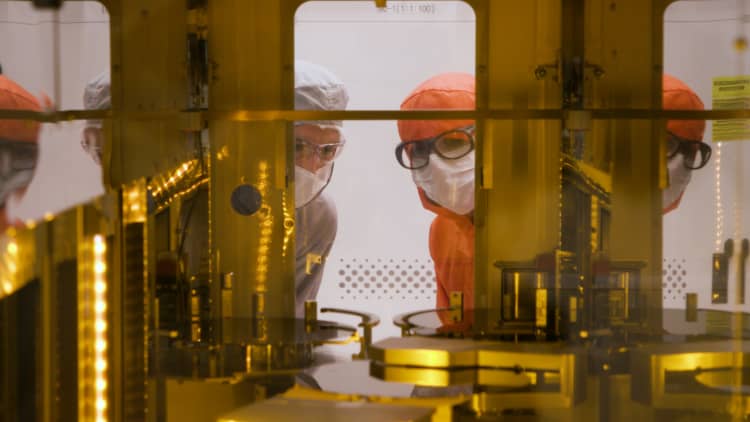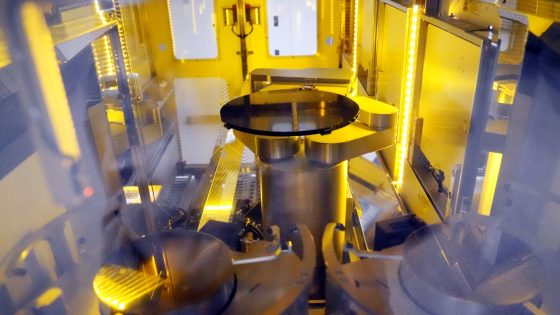The semiconductor industry is recruiting workers in a tight labor market as the competition for talent ramps up and funding from the CHIPS and Science Act designed to spur domestic production continues to be dispersed.
It is also staring down a projected shortfall of as much as one million workers in the broader U.S. economy by 2030 as generative artificial intelligence adds fuel to the in-demand sector.
The U.S. chips industry is expected face a shortage of 67,000 technicians, computer scientists and engineers by 2030, while the broader U.S. economy is set to have a gap of 1.4 million such workers, according to a 2023 study from the Semiconductor Industry Association.
A separate study from Deloitte found the talent crunch in the semiconductor space could get even worse due to the global economic environment and ongoing supply chain issues.
A wafer sorter inside the GlobalFoundries semiconductor manufacturing facility in Malta, New York, on June 18, 2024.
Cindy Schultz | Bloomberg | Getty Images
GlobalFoundries, the third-largest chipmaker globally, is casting a wide net to recruit talent. The company has sought out veteran candidates, along with candidates from its own workforce reentry program and an initiative for women in construction.
The company creates chips for everyday products from electronics and phones to autos, in addition to components for space and defense. Major clients include General Motors and Lockheed Martin.
In 2021, the company launched the sector’s first registered apprenticeship program, which is full time and paid with benefits, with training at no cost to the apprentice. It is completed in two years or less, and requires only a high school diploma or equivalent and interest in the mechanical field. Some 50 apprentices have gone through the program so far, the company said. It has recruited graduates with technical associate degrees from regional community colleges and veterans transitioning out of the military for the program.
GlobalFoundries is working to fill hundreds of roles at a time worldwide, and hires thousands annually, a pace it expects to continue, Chief People Officer Pradheepa Raman told CNBC in an interview. Raman said keeping the same size workforce is “not an option” for the industry as demand soars. The needs range from technicians to product managers and corporate roles.Â
“It’s why we are very, very aggressive when it comes to our workforce development efforts,” Raman said. “And if you’re not getting traditional talent, [the solution is] cross-training talent, identifying alternate talent pools, people who are doing things in different fields, showing them that this is a very welcoming set of opportunities that exists within the semiconductor industry, is our approach.”
The GlobalFoundries semiconductor manufacturing facility in Malta, New York, on June 18, 2024.
Cindy Schultz | Bloomberg | Getty Images
Workers also have room for advancement, and training and retaining existing workers is key in this competitive environment. Morgan Woods, 28, started out in Malta, New York, at GlobalFoundries’ fab facility as a technician in 2021. Woods has now moved into a training and development analyst role with the company, overseeing training for technicians, engineers and management, plus ensuring compliance. Woods said compliance is crucial as the company expands into the automotive space, working with GM.
“As the demand for the microchips increases, we definitely need more manpower to help support the constant rollout of microchips and meeting our daily targets,” Woods said.Â
Woods has taken advantage of a benefit from GlobalFoundries launched in May, allowing eligible U.S.-based employees and new hires to receive a tax-free lifetime total of $28,500 toward student debt. It includes qualified loans for all degree types and credit-based certificate programs offered by U.S. universities and colleges. So far, the number of applicants has topped 200, exceeding expectations, the company said.
“By participating in this program, I will be in a much better financial position to purchase a home within the next few years, as well as look at expanding my family and having children,” Woods said.Â
Beyond helping to create roles in engineering and computer science, funding from the CHIPS and Science Act will also bolster growth for GlobalFoundries’ manufacturing fabs in New York and Vermont. In February, the company announced $1.5 billion in planned CHIPS funding to expand manufacturing capacity. It projects that funding, along with local and state money, will help create some 1,500 manufacturing jobs and 9,000 construction jobs over the lifetime of planned projects.
Manufacturing and construction have faced worker shortages of their own recently, and aim to lure new and younger hires to the field.
“We believe the challenges that we face in recruiting can be solved through an ecosystem approach of workforce development and making our organization one of the best places to work through the benefits offerings that we have been providing,” Raman said.

Source Agencies


